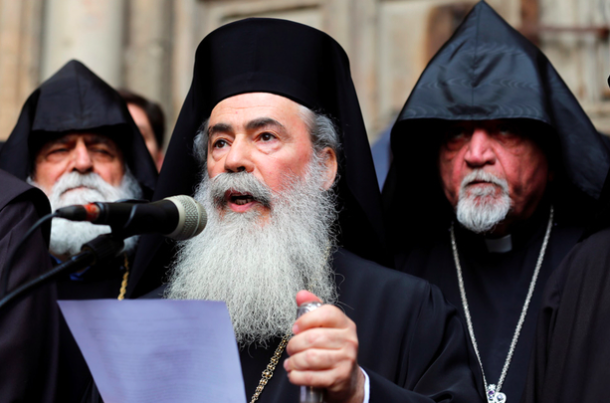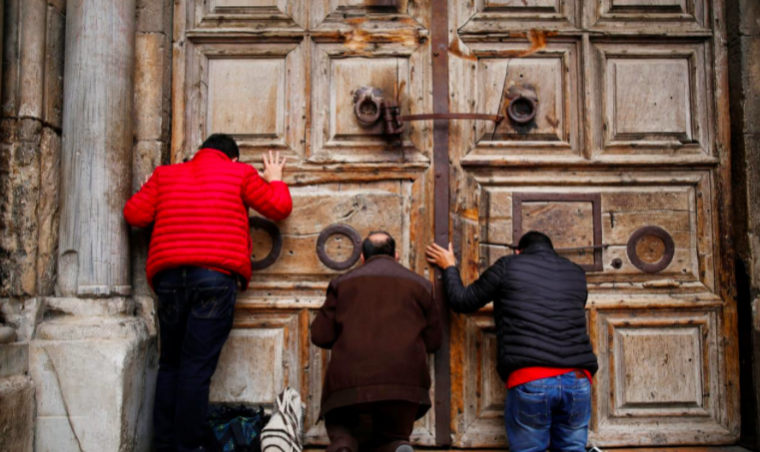The Holy Sepulchre: Inside the story of a well kept secret plan to shut the holiest church in Christianity
The various denominations who run the holiest site in Christianity, the Church of the Holy Sepulchre in Jerusalem, may frequently fall out – and cannot even agree to shift the 'immovable ladder' that is propped up under a window in the church and is the subject of a 150-year-old dispute between the various groups.
But when it comes to the crunch, they sure know how to keep a secret.
For one of the most remarkable elements to the sensational story of the church's closure yesterday is that, given the different sides involved, it didn't leak out.
After all, the decision was taken 24 hours earlier at a meeting of church leaders on Saturday inside the Old City.
It had been called by the Greek Orthodox Patriarch, Theophilos III, who decided to push for what insiders called 'the nuclear option' on Friday afternoon.

And far from disagreeing, in the event the Vatican actually hardened up the Greek proposed statement.
It came after the double blow of news that the Jerusalem municipality was effectively imposing retrospective taxes on Holy Land churches and the bringing forward of a scheduled bill in the Knesset, the Israeli parliament, that affected church lands.
The move, backed by the Catholics and the Armenians, had the desired effect. The news went around the world, from Jerusalem to Washington, from dailymail.com to Al Jazeera, and within hours key Israeli politicians were rowing back.
An Israeli cabinet committee duly delayed by a week its scheduled consideration on Sunday of the church lands bill, sponsored by Israeli settlers, that would allow the state to expropriate land in Jerusalem sold by churches to private real estate firms in recent years.
The stated aim of the bill is to protect homeowners against the possibility that private companies will not extend their leases of land on which their houses or apartments stand. However, the churches say that the 'bill of church lands', proposed by the Knesset member, Rachel Azaria (of the 'Kulanu' party) would give the Israeli government the power to confiscate church property.
Along with the mayor of Jerusalem's decision to lift the tax exemption, the actions, the churches say, contravene the long held 'status quo' between the churches and the state of Israel.
The closure was announced on Sunday by the Greek Orthodox Patriarch of Jerusalem, the Catholic Custos of the Holy Land and the Armenian Patriarch. Their joint statement argues that 'the systematic campaign against the churches and the Christian community in the Holy Land' has 'reached an unprecedented level as the Jerusalem municipality issued scandalous collection notices and orders of seizure of church assets, properties and bank accounts for alleged debts of punitive municipal taxes.' The statement also highlights the 'discriminatory and racist bill that targets solely the properties of the Christian community in the Holy Land'.

Further, the churches say, both developments come in a period when Christians are suffering an escalating campaign of intimidation from radical settler groups, with churches facing daily desecration and vandalism and Christians being regularly subjected to violent assault as they travel to pray. The church leaders say that the settlers groups have long used intimidation, bribery and extreme anti-social behaviour in an attempt to force Christians and other non-Jews out of the Holy City. The churches say that while the settlers' actions clearly contravene Israeli law their crimes go largely unchecked.
Ironically, the Greek Patriarch faces criticism from Palestinians that he is too close to the Israelis. But in the end, it was the issue of money that caused all church leaders to unite against Israel.
The Jerusalem municipality recently announced that it would start collecting property tax from church-owned properties. As well as hotels and businesses, these include residences for the community including those within monasteries, community centres, schools and clinics.
However, the timing of the move was down to the fact that the committee was to meet yesterday to consider advancing the bill, which has – or had – the support of 40 Knesset members.
But with the holiest site in Christianity closed, and the eyes of world pilgrims and media suddenly on these Israeli actions, whether the tax charges or the bill will now go ahead remains to be seen.











